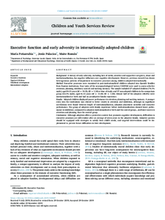Displaying 171 - 180 of 726
The main focus of this chapter is to define institutions, their objectives and the nature of services rendered.
In this study, executive functions were examined in post-institutionalized children adopted into Spanish families from Russian institutions.
The main finding of this report from Disability Rights International (DRI) is that Bulgaria has replaced a system of large, old orphanages with newer, smaller buildings that are still operating as institutions.
This study extends research on the effects of institutionalization—by examining the trajectories of cognitive, language and motor development of 64 Portuguese infants and toddlers across the first six months of institutionalization, while determining whether pre-institutional adversities and the stability and consistency of institutional care predict children’s development.
A World Without Orphans original animation. Find out more at: www.worldwithoutorphans.org
This study examined whether and how postadoption parenting promotes recovery in children experiencing early life adversity in the form of institutional care. Results support the notion that postadoption parenting during toddlerhood and the early preschool years promotes better regulation skills following early adversity.
For this study, friendship characteristics, social behaviors with peers, normed assessments of social problems, and social cue use were assessed in 142 children, of whom 67 were previously institutionalized (PI), and 75 were raised by their biological families.
The purpose of this presentation is to summarize findings from the Bucharest Early Intervention Project (BEIP) - the only randomized, controlled trial of foster care (FC) as an alternative to institutional care ever conducted - regarding psychopathology and competence through age 12 years.
In this article, institutions in Russia, China, Ghana, and Chile are described with reference to the circumstances that lead to children’s institutionalization, resident children’s social-emotional relationships, and unique characteristics of each country’s institutional care (e.g., volunteer tourism in Ghana, and shifting demographics of institutionalized children in China).
The goal of this paper was to review and critique the literature examining predictors of better-than-expected adjustment of children who have experienced institutional care.


